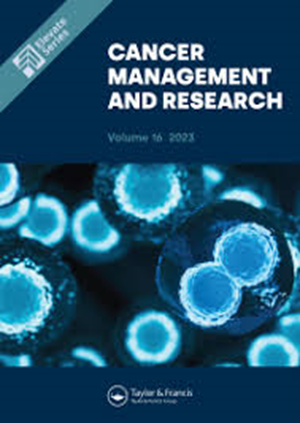基于机器学习的总胆红素和 CA50 筛选对膀胱癌患者复发的预测价值
IF 2.5
4区 医学
Q3 ONCOLOGY
引用次数: 0
摘要
目的:复发是膀胱癌预后不良的主要因素:复发是膀胱癌预后不良的主要因素。因此,有必要开发新的生物标志物来预测膀胱癌的预后。在这项研究中,我们使用基于各种临床变量的机器学习(ML)方法来筛选膀胱癌预后生物标志物:共有 345 名膀胱癌患者参与了这项回顾性研究,他们被随机分为训练组和测试组。我们使用了五种有监督的聚类 ML 算法:决策树(DT)、随机森林(RF)、自适应提升(AdaBoost)、梯度提升机(GBM)和极端梯度提升(XGBoost),通过 34 个临床参数获得预测信息:通过比较五种多项式算法,我们发现总胆红素(TBIL)和CA50在预测膀胱癌复发方面表现最佳。此外,两者的综合预测性能优于任何单一指标的预测性能:结论:ML 技术可以评估膀胱癌的复发情况。本研究表明,TBIL 和 CA50 的联合应用可以改善膀胱癌复发的预后预测,从而帮助临床医生做出决策并制定个性化的治疗策略。本文章由计算机程序翻译,如有差异,请以英文原文为准。
Predictive Value of the Total Bilirubin and CA50 Screened Based on Machine Learning for Recurrence of Bladder Cancer Patients
Purpose: Recurrence is the main factor for poor prognosis of bladder cancer. Therefore, it is necessary to develop new biomarkers to predict the prognosis of bladder cancer. In this study, we used machine learning (ML) methods based on a variety of clinical variables to screen prognostic biomarkers of bladder cancer.
Patients and Methods: A total of 345 bladder cancer patients were participated in this retrospective study and randomly divided into training and testing group. We used five supervised clustering ML algorithms: decision tree (DT), random forest (RF), adaptive boosting (AdaBoost), gradient boosting machine (GBM), and extreme gradient boosting (XGBoost) to obtained prediction information through 34 clinical parameters.
Results: By comparing five ML algorithms, we found that total bilirubin (TBIL) and CA50 had the best performance in predicting the recurrence of bladder cancer. In addition, the combined predictive performance of the two is superior to the performance of any single indicator prediction.
Conclusion: ML technology can evaluate the recurrence of bladder cancer. This study shows that the combination of TBIL and CA50 can improve the prognosis prediction of bladder cancer recurrence, which can help clinicians make decisions and develop personalized treatment strategies.
Keywords: bladder cancer, recurrence, machine learning, biomarkers, retrospective study
Patients and Methods: A total of 345 bladder cancer patients were participated in this retrospective study and randomly divided into training and testing group. We used five supervised clustering ML algorithms: decision tree (DT), random forest (RF), adaptive boosting (AdaBoost), gradient boosting machine (GBM), and extreme gradient boosting (XGBoost) to obtained prediction information through 34 clinical parameters.
Results: By comparing five ML algorithms, we found that total bilirubin (TBIL) and CA50 had the best performance in predicting the recurrence of bladder cancer. In addition, the combined predictive performance of the two is superior to the performance of any single indicator prediction.
Conclusion: ML technology can evaluate the recurrence of bladder cancer. This study shows that the combination of TBIL and CA50 can improve the prognosis prediction of bladder cancer recurrence, which can help clinicians make decisions and develop personalized treatment strategies.
Keywords: bladder cancer, recurrence, machine learning, biomarkers, retrospective study
求助全文
通过发布文献求助,成功后即可免费获取论文全文。
去求助
来源期刊

Cancer Management and Research
Medicine-Oncology
CiteScore
7.40
自引率
0.00%
发文量
448
审稿时长
16 weeks
期刊介绍:
Cancer Management and Research is an international, peer reviewed, open access journal focusing on cancer research and the optimal use of preventative and integrated treatment interventions to achieve improved outcomes, enhanced survival, and quality of life for cancer patients. Specific topics covered in the journal include:
◦Epidemiology, detection and screening
◦Cellular research and biomarkers
◦Identification of biotargets and agents with novel mechanisms of action
◦Optimal clinical use of existing anticancer agents, including combination therapies
◦Radiation and surgery
◦Palliative care
◦Patient adherence, quality of life, satisfaction
The journal welcomes submitted papers covering original research, basic science, clinical & epidemiological studies, reviews & evaluations, guidelines, expert opinion and commentary, and case series that shed novel insights on a disease or disease subtype.
 求助内容:
求助内容: 应助结果提醒方式:
应助结果提醒方式:


